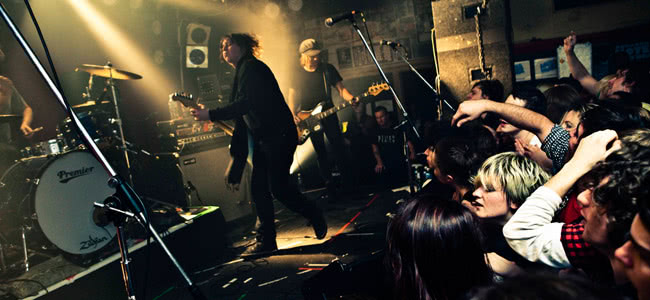Following on from announcing their pledge of $27 million towards community radio broadcasters should they claim victory in the upcoming election, the Greens party have made another push for the Australian music scene’s vote.
The Greens have promised new policies to support emerging musicians and artists by enabling their playing, performing, and recording to count as part of altercation to the rules for Centrelink, as The Australian reports.
The plan is estimated to cost $12 million and will find the Greens pushing to have emerging musicians and their creative output recognised as valid work and contribution to the community, legitimising their activity as under the “mutual obligation” agreements of Centrelink while allowing them to continue to collect benefits without having to compromise their music career for the sake of multiple dead end casual wage jobs to make ends meet.
It’s a point that Greens leader Christine Milne specifically emphasised in launching the party’s arts policy in Melbourne alongside MP Adam Bandt, that included the new Centrelink proposal; “artists everywhere are having to work several jobs in order to survive and that’s effectively compromising their ability to develop their art form,” she says.
Milne, who previously pushed for stronger financial government support of the arts earlier in the year, points towards figures showing that the live music industry in Australia is worth $1.2 billion a year, and yet the “normal annual wage” for a working musician and performer is just $8,100, in strong contrast to the Greens’ statistics that show visual artists receive an annual salary of $35,000 from an average 42 hour work week.
The Centrelink plan that recognises musician’s output as valid to receive benefits was Greens policy in 2010, and Labor policy before that in 2007 until it was rejected by then treasurer Peter Costello, while the Musicians Union of Australia has rejected the plan on the basis that venues relying on the unpaid work of musicians was an issue. “If you have a situation where payments are so bad that people have to get assistance from Centrelink, then we are not talking about a vibrant music scene,” said MUA Federal Secretary Terry Noone.
Music Victoria however, have applauded the Greens on its arts policy for its support of artists and musicians in particular.
Love Music?
Get your daily dose of metal, rock, indie, pop, and everything else in between.
Enabling musicians to include their work – including performance, rehearsals and marketing – as artistic activities eligible for Centrelink mutual obligation requirements, as well as its plans to provide tax breaks to start their own small businesses, would allow more artists to focus on their careers and send a message to artists that this country values their craft, and the economic, social and cultural contribution to society.
Music Victoria looks forward to hearing from all other parties regarding their music and arts policies ahead of the Federal election to work together towards creating sustainable careers for music practitioners.”
A 2011 survey by the state music body, entitled Barriers To Career Progression found that there was widespread dissatisfaction from the music community that Centrelink did not recognise the works of practising musicians as valid.
“As far as Centrelink and Job Prospects were concerned, being in a band was not considered “work,” and I was forced to “apply” for jobs I had no intention of taking to avoid being cut off from payments,” reads one response in the 2011 reader report; “[all] the while, working extremely hard (although with few immediate financial rewards) with the band.”
The Greens Arts Policy also includes the creation of a $3 million plan to pay artists that contribute to non-commercial arts events, as well as an additional $3 million towards the ArtStart program that supports and fosters emerging artistic talent.
Senator Milne, who has previously detailed a $10 million plan for the Greens to support the arts, has said that the arts are an important contribution to the economy – as best demonstrated in Music Victoria’s recent survey that showed Victoria’s live music scene contributed $1.04 billion to local economy, making it bigger than AFL.
The Greens leader calls arts and music as part of a ‘knowledge economy’ that – unlike other sectors – doesn’t depend as much on natural resources and wastage to generate revenue; “If you are serious about transitioning to a knowledge, information, service-based economy, then you back education and creativity,” Milne says.
You can read the Australian Greens’ full Arts Policy here.

































